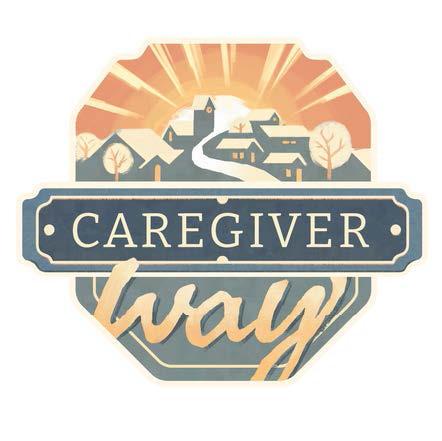

Social Wellness for Caregivers

An update from Tia Drumm, Caregiver Programs Coordinator
In a time when loneliness is on the rise, social wellness is more important than ever. According to the CDC, 1 in 3 adults in the U.S. report feeling lonely, and 1 in 4 say they lack social or emotional support. For caregivers especially, isolation can creep in, making it essential to stay connected.
The National Institutes of Health (NIH) reports that our relationships can significantly impact our health. Positive social connections influence not only emotional well-being but also physical health, including improved immune function, better sleep, and reduced stress.
So, what does social wellness look like for you? Do you have a favorite place to go, a hobby you enjoy, or a group activity that sparks your interest? Start with what you love and look for ways to share it with others.
Here are some tips to improve your social wellness:
• Stay in touch. Don’t wait for others to reach out. A quick message or call—even just to say hello—can make a big difference.
• Care for yourself. Accept help when it’s offered. Asking for support isn’t a weakness—it’s a strength and a sign of healthy boundaries.
• Volunteer. Local libraries, animal shelters, and senior centers are always looking for help—and it’s a great way to meet others.
• Honor your needs. Social wellness doesn’t mean constant interaction. If recharging looks like solo time at the movies, reading at the library, or browsing the grocery store, embrace it.
• Explore local events. Look for outings you and your loved one can enjoy together—senior center activities, library programs, or even collegehosted events. Look for events just for yourself, too! Schedule some respite time for a future activity.
Summer is the perfect season to get started—grab a cold drink, say hello to someone new, and give yourself permission to enjoy the moment; you deserve it!
For more information about LifeStream’s STEP In Caregiver Programs, contact Tia Drumm at (765) 759-1121 ext. 101 or stepin@lifestreaminc.org.
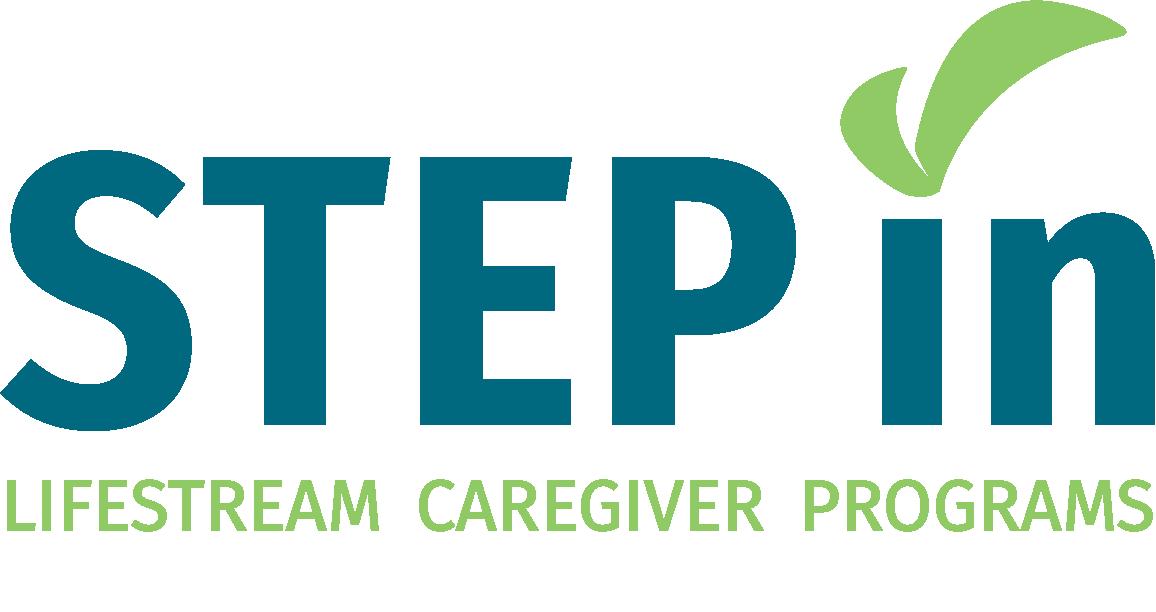

Cozy Corner
An update from Kelly Smith, Dementia Outreach Specialist
Aging is a natural part of life but how we age can look very different depending on the choices we make today. The good news? It’s never too late (or too early) to support your body and brain through simple, healthy habits, especially when it comes to what you eat and how you move.
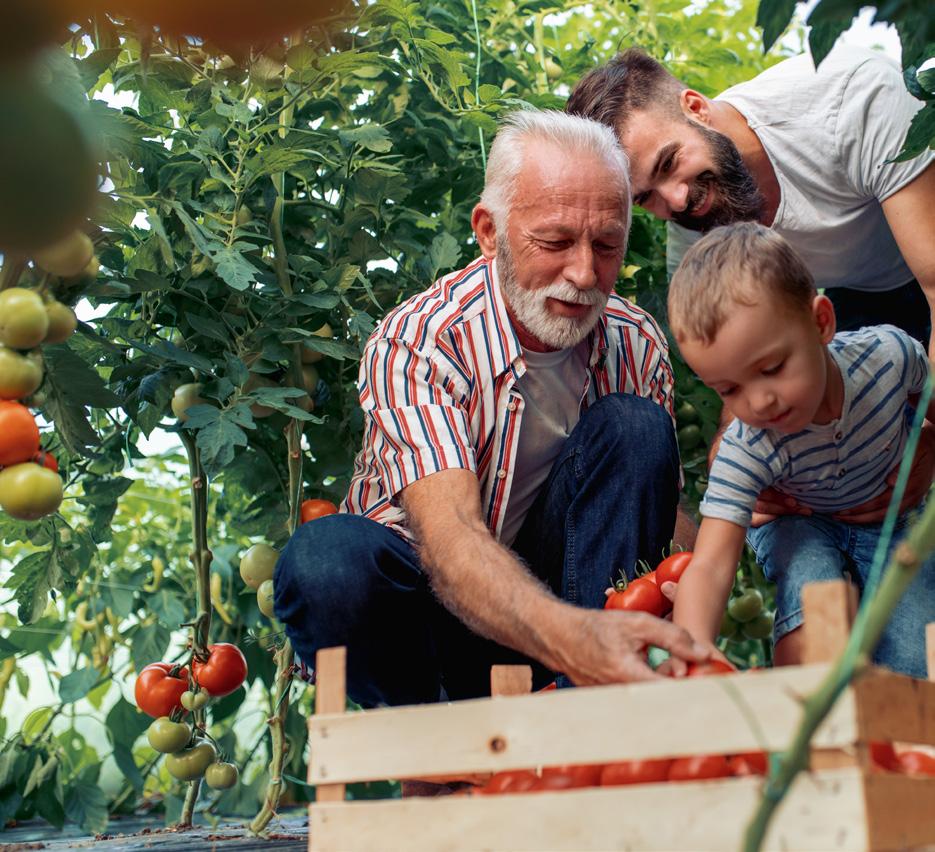
Healthy aging can be achieved by making consistent, thoughtful decisions that help your body feel strong and your mind stay sharp. Here’s how to get started:
1. Eat with Your Brain in Mind: The food you eat directly impacts the health of your brain. That’s because certain nutrients support memory, focus, and even emotional well-being. A good rule of thumb? Build your meals around whole, nutrient-rich ingredients and limit highly processed foods when possible.
Focus on including...
• Leafy greens like spinach, kale, and arugula, which are rich in folate and vitamin K.
• Berries (especially blueberries) which are high in antioxidants that help protect brain cells.
• Fatty fish such as salmon or sardines, are full of omega-3s that support brain function.
• Nuts and seeds, including walnuts and flaxseeds, for healthy fats and vitamin E.
These foods form the foundation of the MIND diet, a research-based eating pattern shown to reduce the risk of Alzheimer’s disease and promote cognitive resilience.
2. Keep Moving: Physical activity is one of the most powerful tools for healthy aging. It’s not just about staying fit—it’s about maintaining balance, mobility, independence, and brain health.
Regular movement increases blood flow to the brain, supports memory, and reduces the risk of chronic diseases like heart disease and diabetes. You don’t need to commit to hours at the gym; the key is consistency. Try to...
• Aim for 150 minutes of moderate activity each week (like brisk walking, dancing, or gardening).
• Include strength training a couple times per week to support bone and muscle health.
• Choose activities you enjoy—you’re far more likely to stick with them when they feel good, not forced.
3. Stay Mentally and Socially Engaged: Keeping your brain active is just as important as keeping your body moving. That means challenging your mind regularly and staying socially connected, both of which can protect against cognitive decline.
Here are some simple ways to stay mentally sharp:
• Read, do puzzles, or take up a new hobby.
• Learn something new, whether it’s a language, an instrument, or a skill.
• Stay socially active through community groups, volunteering, or regular conversations with friends and family. Even small moments of connection or stimulation can make a difference over time.
Aging well is about more than avoiding illness; it’s about maintaining your quality of life, energy, and independence. By choosing brain-healthy foods, staying physically active, and keeping your mind engaged, you can lay a strong foundation for a vibrant future. Start where you are—small steps add up, and your future self will thank you for it.


More on Social Wellness
An update from Gina Harvey, Wellness Educator
We are social creatures—connection with others helps us survive and thrive. As we age, we may find ourselves alone more often than when we were younger.
Life events such as retirement, loss of a loved one, or a move can impact our lives in many ways. You may be at an increased risk for social isolation or loneliness if you live alone, struggle financially, or are a full-time caregiver.
Having regular social engagement and a chance to experience meaningful relationships and emotional support can improve your overall wellness. Without it, you are at risk of developing high blood pressure, heart disease, cognitive decline, and possibly depression. There is a connection between feeling alone and disconnected that can lead to negative self-talk. How we speak to ourselves directly affects how we feel and can inhibit us from experiencing joy. One way to combat this is to practice gratitude and thankfulness. Name one thing that you are thankful for each day and help turn your focus toward the positives in your life.
We have a responsibility as a community and friend to foster social connections and create social engagement opportunities. Group activities, support groups, and volunteer opportunities are all wonderful ways to support social connections for older adults. Have you heard the phrase “It doesn’t cost you anything to be kind”? Taking a moment to lend an ear can make all the difference in someone’s day.
So, what can you do to maintain or improve your social wellness? Start by having a meaningful conversation with at least one person every day. Treat your relationships with others like a houseplant—they need water and sunshine daily. Establish a daily social routine, just like having coffee every morning or watching the news.
Become more active! Exercise comes in many forms, from taking a short walk to joining an exercise class at your local senior center. Staying active will help you maintain both your physical and mental health. Joining a wellness class or exercise group can provide you with great opportunities to establish a connection with others.
LifeStream’s Wellness Programs offer many evidence-based courses that will help you foster social wellness. Some classes include Drums Alive, A Matter of Balance, Healthy Eating Every Day, and Bingocize. All of our courses are group-based activities and opportunities to increase your activity levels, learn about fitting in nutrition, and reduce your falls risk… not to mention the chance to make new friends!
Today is the perfect time to do something that your future self will thank you for. Make the call, go to the class, ask to volunteer, or visit a local senior center. Focus on your social wellness and know that you are doing something good for yourself. We’re all in this together, so let’s take the time to connect with someone today!
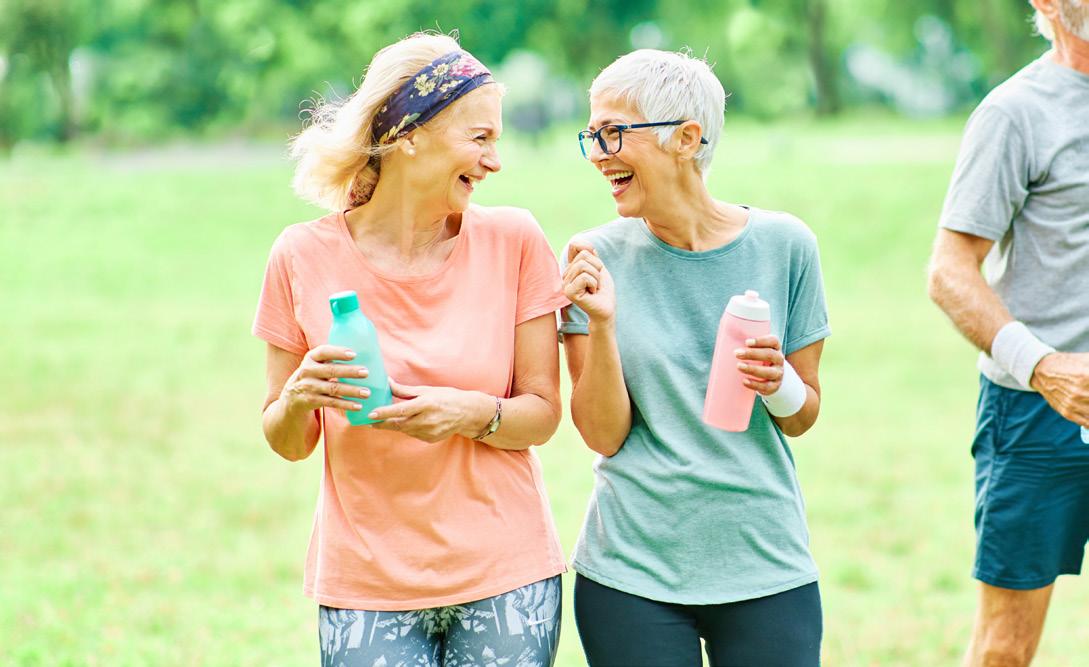


Sleeping Habits
An update from Rachel Gray, Care Coach
Sleep plays a crucial role in maintaining physical and mental health, and this is especially true for individuals living with dementia. Disruptions in sleep are common among those with dementia, often due to changes in brain function, medications, or underlying health conditions. Poor sleep can exacerbate symptoms such as confusion, agitation, and memory loss, making it essential to establish healthy sleeping habits to support overall wellness.
Here are some tips for promoting better sleep:
1. Establish a Consistent Routine: Keeping a regular schedule for bedtime and wake-up time helps reinforce the body’s natural circadian rhythm.
2. Create a Calming Environment: A quiet, comfortable, and dimly lit bedroom can reduce agitation and promote relaxation.
3. Encourage Daytime Activity: Light exercise and exposure to natural sunlight during the day can improve nighttime sleep and reduce daytime napping.
4. Limit Stimulants: Avoid caffeine, alcohol, and heavy meals in the evening, as they can interfere with falling and staying asleep.
5. Monitor Naps: While short naps may be beneficial, long or late-afternoon naps can disrupt nighttime sleep.
6. Address Medical Issues: Pain, urinary frequency, and medication side effects can impact sleep. Regular medical reviews can help manage these factors.
Supporting healthy sleep habits in individuals with dementia is a vital part of holistic care. With a structured approach and a supportive environment, caregivers can significantly improve the sleep quality, and overall wellness, of their loved ones. Small changes can lead to meaningful improvements in mood, behavior, and quality of life.
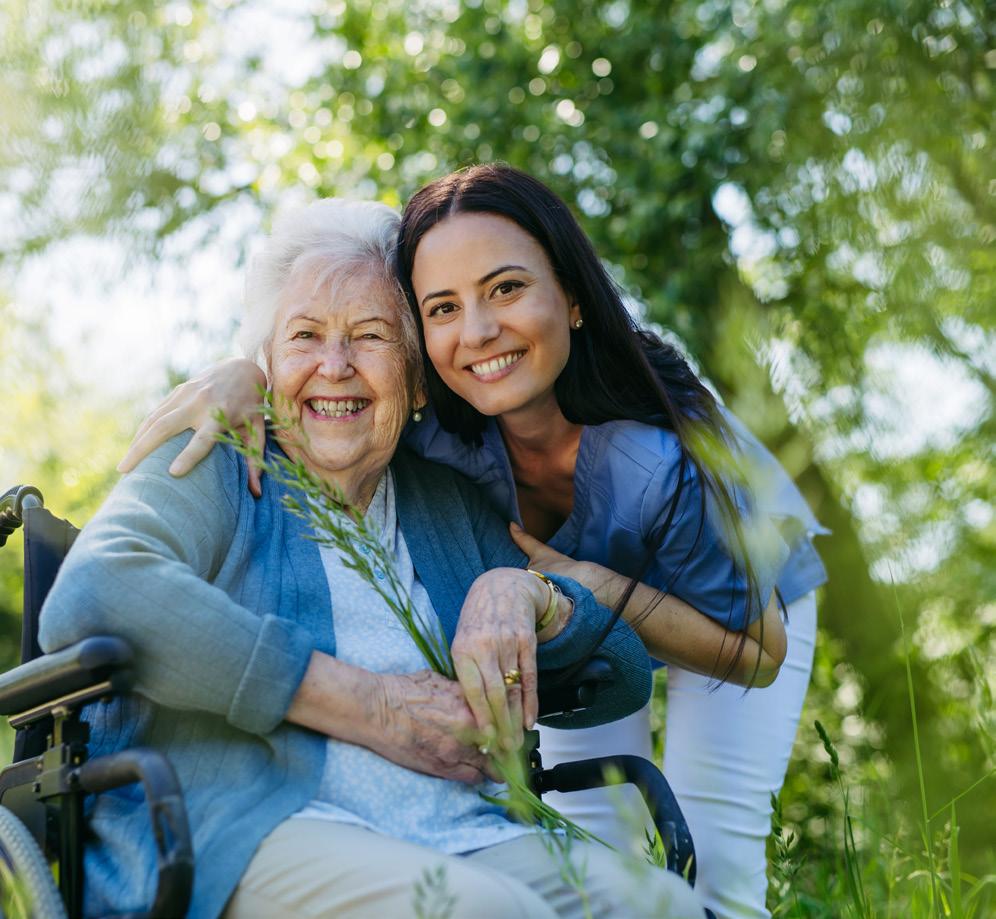




Staying Cool and Hydrated
As summer arrives with scorching temperatures and relentless sun, staying cool and hydrated becomes essential for health and comfort. High heat can lead to dehydration, heat exhaustion, or even heatstroke if precautions aren’t taken. By adopting simple strategies, you can enjoy the season while keeping your body safe and refreshed.
Here are a few practical ways to stay cool and hydrated this summer:

Hydration: Water is the cornerstone of staying healthy in hot weather. The body loses fluids through sweat, and failing to replenish them can lead to fatigue, dizziness, and more severe conditions. Aim to drink at least 8–10 cups of water daily, more if you’re active or spending time outdoors. Carry a reusable water bottle to sip throughout the day, making hydration a habit. Infusing water with lemon, cucumber, or mint can make drinking more enjoyable without added sugars found in many commercial beverages. Electrolytes such as sodium and potassium are also critical, especially during intense heat or exercise. Sweat depletes these minerals which help regulate bodily functions. You can make your own electrolyte drink, avoiding the store-bought sugar infused options. Mix water with a pinch of salt, a splash of lemon juice, and a teaspoon of honey or natural maple syrup.
Cooling Your Body: Beyond hydration, keeping your body temperature down is vital. Wear lightweight, loose-fitting, and light-colored clothing made of breathable fabrics like cotton or linen. These allow air circulation and reflect sunlight, unlike dark colors that absorb heat. Wide-brimmed hats and sunglasses provide additional protection from the sun’s rays. Timing outdoor activities wisely can minimize heat exposure. Plan workouts, errands, or hikes for early morning or late evening when temperatures are cooler. If you must be outside during peak heat, take frequent breaks in the shade or indoors.



Creating a Cool Environment: Your surroundings play a big role in staying comfortable. At home, use fans, air conditioning, or both to maintain a cool environment. Keep blinds or curtains closed during the day to block out heat. If air conditioning isn’t available, create a cross-breeze by opening windows on opposite sides of the house. Taking cool showers or soaking your feet in cold water can provide quick relief. When outdoors, seek shaded areas or use umbrellas. For those without access to cooling, community cooling centers are available during heat waves. Indiana 211 is your community’s resource for updated locations and hours of cooling centers in your area.
Diet and Lifestyle Tips: What you eat impacts hydration and body temperature. Opt for water-rich foods like watermelon, cucumbers, and leafy greens, which contribute to fluid intake. Avoid heavy, greasy meals that can increase body heat during digestion. Limit caffeine and alcohol, as they can dehydrate you. Finally, listen to your body. Symptoms like excessive thirst, dry mouth, or lethargy signal dehydration or overheating. Act quickly by drinking water, cooling off, and resting. By prioritizing hydration, dressing smartly, and managing your environment, you can thrive in summer’s heat while staying safe and comfortable.
1701 Pilgrim Blvd.
Yorktown, IN 47396
lifestreaminc.org
(800) 589-1121 | lifestreaminc.org | facebook.com/lifestreamservices
Caregiver Way
Caregiver Way is an online community (website) where family caregivers gather to become empowered through trusted information, meaningful connection, and self-awareness.
Caregiver Way features articles, videos, audio, etc. and a platform to connect with other caregivers in five categories:
• Self-Care
• Caring for your Loved One
• Financial & Legal
• End-of-Life Care
• Life After Caregiving
LifeStream is partnering with Caregiver Way to offer the first year subscription for free to you. To get started, contact Tia Drumm, LifeStream Caregiver Programs Coordinator, at stepin@lifestreaminc.org or (765) 759-1121 ext. 101.
